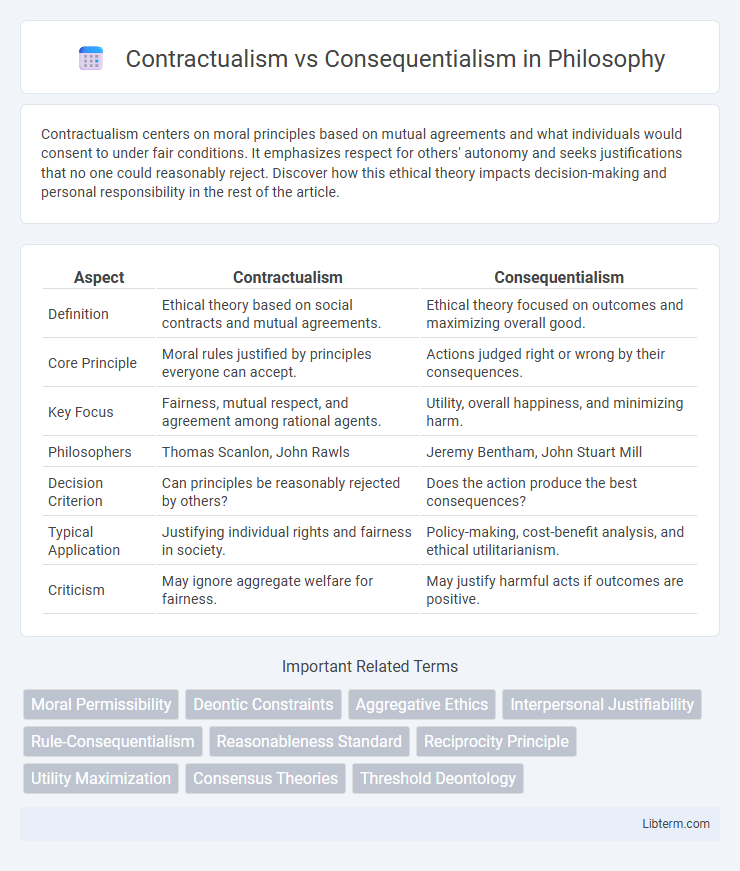Contractualism centers on moral principles based on mutual agreements and what individuals would consent to under fair conditions. It emphasizes respect for others' autonomy and seeks justifications that no one could reasonably reject. Discover how this ethical theory impacts decision-making and personal responsibility in the rest of the article.
Table of Comparison
| Aspect | Contractualism | Consequentialism |
|---|---|---|
| Definition | Ethical theory based on social contracts and mutual agreements. | Ethical theory focused on outcomes and maximizing overall good. |
| Core Principle | Moral rules justified by principles everyone can accept. | Actions judged right or wrong by their consequences. |
| Key Focus | Fairness, mutual respect, and agreement among rational agents. | Utility, overall happiness, and minimizing harm. |
| Philosophers | Thomas Scanlon, John Rawls | Jeremy Bentham, John Stuart Mill |
| Decision Criterion | Can principles be reasonably rejected by others? | Does the action produce the best consequences? |
| Typical Application | Justifying individual rights and fairness in society. | Policy-making, cost-benefit analysis, and ethical utilitarianism. |
| Criticism | May ignore aggregate welfare for fairness. | May justify harmful acts if outcomes are positive. |
Defining Contractualism and Consequentialism
Contractualism defines moral rightness based on principles that individuals would agree upon under hypothetical social contracts, emphasizing mutual respect and justifiability to others. Consequentialism evaluates the morality of actions solely by their outcomes, asserting that the best action is the one that maximizes overall good or utility. Contractualism centers on fairness and agreement among rational agents, while consequentialism prioritizes the results and impacts of actions on overall well-being.
Historical Origins and Philosophical Foundations
Contractualism originates from social contract theories advanced by philosophers like Thomas Hobbes, John Locke, and further developed by T.M. Scanlon, emphasizing morality based on mutually agreed principles among rational agents. Consequentialism traces its roots to the utilitarian ideas of Jeremy Bentham and John Stuart Mill, focusing on the moral worth of actions determined by their outcomes, specifically maximizing overall happiness or utility. Both frameworks provide foundational ethical theories, with Contractualism stressing fair agreement and Consequentialism prioritizing the results of actions.
Key Proponents and Influential Thinkers
Contractualism is prominently associated with philosophers Thomas Scanlon and John Rawls, who emphasize moral principles as agreements individuals could reasonably reject or accept. Consequentialism, particularly utilitarianism, is notably championed by Jeremy Bentham and John Stuart Mill, focusing on maximizing overall happiness or utility as the core ethical guideline. Both frameworks have profoundly influenced modern moral philosophy, shaping debates on justice, rights, and ethical decision-making.
Core Principles of Contractualism
Contractualism is grounded in the principle that moral rightness arises from agreements or contracts among rational agents, emphasizing mutual respect and justifiability to others. It holds that actions are morally permissible only if they can be justified to each person affected, prioritizing fairness and individual rights over aggregate outcomes. This contrasts with consequentialism, which evaluates morality based on the overall consequences or utility produced by an action.
Core Tenets of Consequentialism
Consequentialism centers on the principle that the morality of an action is determined solely by its outcomes or consequences. Core tenets include maximizing overall good or utility, often quantified through measures like happiness, well-being, or preference satisfaction. This ethical framework contrasts with Contractualism, which emphasizes the fairness of principles agreed upon by individuals rather than the results of actions.
Decision-Making Processes Compared
Contractualism emphasizes decision-making through mutual agreement and adherence to mutually acceptable principles, ensuring respect for individuals' rights and moral duties. Consequentialism prioritizes outcomes by evaluating actions based on their results, aiming to maximize overall well-being or utility. In practice, contractualism stresses fairness and moral justification, while consequentialism focuses on the comparative benefits and harms produced by decisions.
Strengths and Criticisms of Contractualism
Contractualism emphasizes moral principles based on mutual agreement and justifiability to others, providing a strong foundation for fairness and respect in ethical decision-making. Its strength lies in promoting accountability and cooperation by requiring individuals to justify actions as acceptable to all affected parties. Criticisms of contractualism include challenges in defining whose agreement matters, difficulties in resolving conflicts between competing contracts, and potential exclusion of those unable to participate in the agreement process.
Strengths and Criticisms of Consequentialism
Consequentialism emphasizes outcomes, promoting actions that maximize overall good, which allows flexible moral reasoning tailored to diverse situations and fosters clarity in ethical decision-making. Critics argue it risks justifying harmful means for beneficial ends, potentially overlooking individual rights and justice by focusing solely on aggregate consequences. Its strength in promoting welfare and practicality is counterbalanced by challenges in accurately predicting outcomes and addressing moral duties beyond result-based evaluations.
Real-World Applications and Ethical Dilemmas
Contractualism emphasizes agreements and mutual respect in ethical decision-making, influencing real-world applications like business negotiations and legal frameworks where consent and fairness are critical. Consequentialism evaluates actions based on outcomes, guiding policies in healthcare resource allocation and environmental ethics where maximizing overall well-being is prioritized. Ethical dilemmas arise when contractualist commitments clash with consequentialist calculations, such as balancing individual rights against collective benefits in public health mandates.
Contractualism vs Consequentialism: A Comparative Analysis
Contractualism centers on moral principles derived from mutual agreements and the idea of justifiability to others, emphasizing individual rights and the fairness of social contracts. Consequentialism evaluates the morality of actions based on their outcomes, prioritizing the greatest overall good or utility. This comparative analysis highlights Contractualism's focus on justifiability and individual perspectives versus Consequentialism's outcome-driven approach to ethical decision-making.
Contractualism Infographic

 libterm.com
libterm.com